Generation Z Marketing: How to Do It Right in 2023
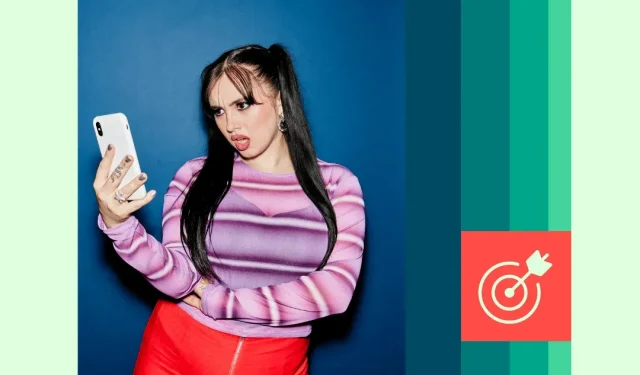
There is no doubt about it: Generation Z is built differently.
But the definition of who is Generation Z varies depending on who you ask (for example, if you ask me, it’s anyone who has never had to rewind a VHS).
You can’t draw a solid line between Generation Z and millennials in time – belonging to a certain “generation”depends not only on age, but also on cultural influence. (Which trauma movie defined your childhood, The Lion King or Up?) However, for the purposes of this blog post, we’ll use the Pew Research Center’s definition: anyone born in 1997 or later is part of Generation Z.
Read on to find out how to effectively target this unique demographic with ever-increasing purchasing power.
Generation Z Marketing vs. Millennials
In the past, Generation Z and millennials often came together as “digital natives”when it came to marketing. For example, this March 2021 Statista study states that 62% of Gen Z and millennials bought something through social media marketing this month, but does not distinguish between the two generations.
Again, the distinction between the two is not always clear. However, there are a few important differences:
- Gen Zers are more likely to have college degrees than millennials. In the US, 57% of Generation Z went on to education after high school (compared to 52% of Millennials and 43% of Generation X).
- In America, Generation Z is more racially and ethnically diverse than millennials. 50% of Generation Z identify as BIPOC, while 39% of millennials identify as BIPOC.
- Although their points of view are similar, Gen Zers are a bit more progressive than millennials. Gen Z tends to be liberal and more likely to support things like same-sex marriage, racial equality, and the use of gender-neutral pronouns.
How to Sell Gen Z: 7 Best Practices
1. Put values first
When interacting with a new brand on social media, Generation Z audiences care about the company as much as they care about the product or service.
45% of Generation Zers say that a brand that “looks trustworthy and transparent” is a big motivator for engagement. So don’t make all your social marketing purely sales: create content that clearly describes your values and share as much of your brand story as possible.
For example, a clothing company looking to market for Generation Z needs to be transparent about what clothes are made of, where they are made, and under what working conditions they are made.
2. Speak their language
Communication is key. Being able to use language that Gen Z can understand and understand is essential, and if you’re not good enough, the best way to learn is by immersion.
Follow the creators of Generation Z, watch their content and pay attention to their vocabulary, abbreviations and jokes. Then kill it.
One caveat: it takes time, and there’s nothing less cool than trying to be cool. Don’t force the tongue (that sounds insincere) and don’t overdo it (that’s ugly). You want to be the cool aunt, not the stubborn stepfather. The surest way to make sure your content speaks Gen Z language? Recruit them to your social team.
(Psst: Gen Z, if you’re looking for social media jobs, here are some tips.)
3. Do not engage in performative activity and alliances
This goes hand in hand with putting values first: by showing a façade of activity without doing anything to actually help the cause, Generation Z will not become like you. In fact, this can lead to you getting banned.
According to Forrester’s Technographics, nearly a third of Generation Z unfollow, hide or block brands on social media weekly. Cause? “Generation Z does not hesitate to cancel brands when they feel superficial visibility.”
A 2022 Forbes article agrees, stating that “younger generations are more likely to associate a brand’s or company’s impact on society in the real world with their buying decisions… sustainability-friendly initiatives.”
So don’t sugar coat your June campaign, use BIPOC staff as decoration for your content, or claim that a product is made sustainably when it really isn’t. Donating real money, inspiring marginalized people, volunteering, and attending marches and rallies are all ways to make a genuine statement in your community.
4. Work with content creators and influencers to build trust
One solid Gen Z marketing strategy is to work with people they trust (and since it’s hard to keep track of all their big sisters, we’re looking for social media influencers).
People between the ages of 15 and 21 are more likely to follow some or many influencers than their older counterparts.

Source: Morning consultation
In addition, 24% of Gen Z women say that when it comes to learning about new products, they most often turn to opinion sources.
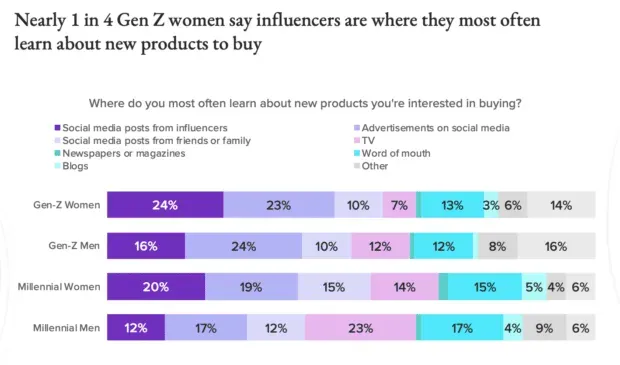
Collaborating with influencers is a very effective way to market for Gen Z. It’s all part of brand authenticity/speaking the language of business: Gen Z want to buy from brands they trust and they learn about brands they trust from people who they trust.
5. Entertain
According to this report by Morning Consult, the reasons Gen Z follow influencers is because they “produce content and information in a highly entertaining way”and “provide interesting content in a more personal setting.”
Boring content will get you nowhere. In addition, Generation Zers say that when deciding whether to follow an influencer or not, being funny or having an attractive personality is the second most important factor.
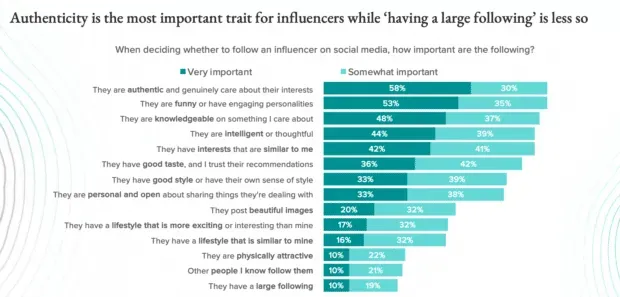
Source: Morning consultation
Generation Z has a sharp, smart, and often black sense of humor – lean on it (of course, of course).
Showing that you can get a joke really matters to this generation.
For example, after a bizarre rumor spread among Generation Z that Lea Michele can’t read, the celebrity responded to TikTok leaning towards a joke. This TikTok has 14.3 million views and the comments are super positive. It was a stroke of genius (whoever is reading this to Lee right now, please tell her).
6. Use the right platforms
The strategies above can only be effective if Gen Z actually sees your content, so make sure you use the same platforms they do. The Hootsuite Global Digital Report is a great source of information on which demographics are using social networking sites.
If you’re trying to connect with Gen Z women, don’t miss TikTok. According to a 2021 study by Statista, TikTok is the third most important advertising channel influencing the purchase decisions of Gen Z women.
The only “channels”that rank above TikTok are real-life recommendations: friend/family recommendations and watching a friend/family use the product. Instagram ads and influencer posts on IG also rank high, while Facebook and Twitter ads are less likely to convince Gen Z women to hand over that sweet sweet money.
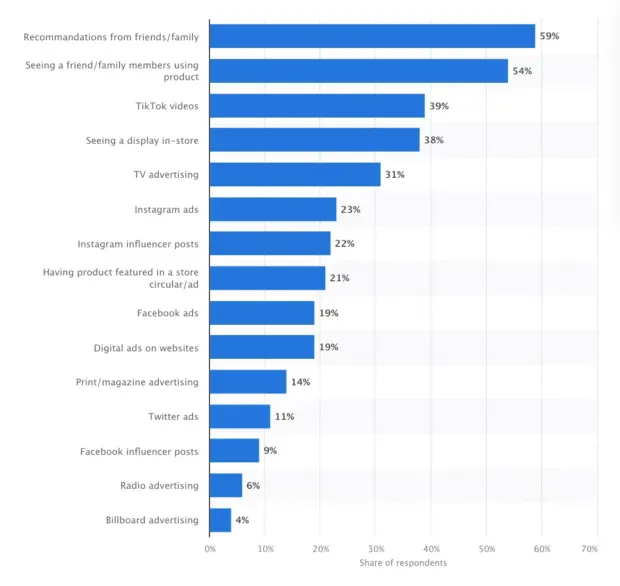
7. Have a sale
Okay, this will work with any generation, but Gen Zers are especially interested in deals.
In May 2022, discounts were found to be the number one reason Gen Z consumers engage with a new brand on social media. So if all else fails, throw a sale.
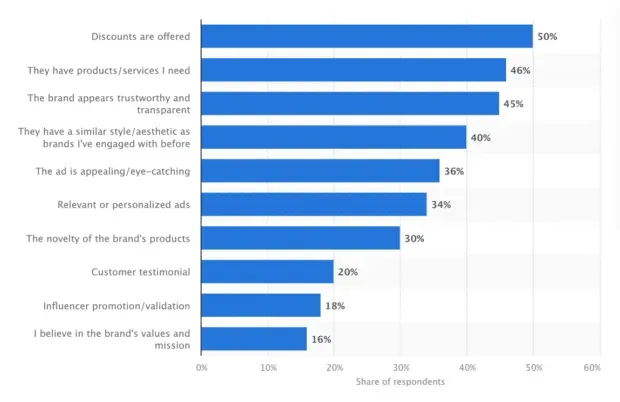
The 6 Best Generation Z Marketing Campaigns
1. That’s So Raven TikTok on ESPN
Cultural references don’t have to be up-to-date – in fact, appealing to a sense of nostalgia is one of the best ways to connect with your audience.
For example, the purpose of this ESPN video was to promote the start of the basketball season. Instead of the usual ads, the brand posted video content referencing the somewhat niche Disney Channel TV show that aired from 2003 to 2007.
@espn Yup, we’re back ? #NBAisBack #thatssoraven #nba #basketball
It was a lighthearted, fun and shareable clip, much more engaging than the traditional commercial. Even non-sports fans shared it, and some even noted that this TikTok convinced them to start watching basketball.
2. Fenty Beauty #TheNextFentyFace campaign
Rihanna’s Fenty Beauty is known for making products for everyone and is truly on the path when it comes to representation in the beauty industry.
The brand’s #TheNextFentyFace campaign was like two campaigns in one: it was a contest to find a model for the upcoming 2023 campaign, but the method of finding that model was an advertisement in itself.
Fenty encouraged its followers to post on TikTok using the campaign hashtag and tagging Fenty Beauty to get involved, encouraging thousands of creators (some with large followings, some with few) to post Fenty Beauty products.
This campaign has it all: it’s an offer to thank consumers (the winner gets a ton of Fenty products, plus a cool modeling experience and a trip to two brand events), it’s a way to encourage followers to share their products, it’s a method to unlock new voices in the industry, and it’s an opportunity. further prove the value of your brand.
10/10, Riri.
3 Patagonia Founder Donates Company To Fight Climate Change
Okay, looking at this as a marketing campaign is pretty distasteful: we’d like to believe that this act of charity from the billionaire was entirely motivated by a genuine concern for the environment.
And perhaps it was. But when Patagonia founder Yvon Chouinard announced he was donating the company (worth $3 billion) to a purpose-built foundation and nonprofit, people went crazy.
Among the supportive emojis and people congratulating the founder on this act of dedication, there are thousands of comments promising to buy Patagonia products. One says, “Thank you for making holiday and birthday shopping so damn easy for the rest of my life on this planet.”
If you’re looking for an example of a company’s true values — and the kind of genuine brand activism that gets Generation Z to your side — this is the place to be.
4. Clean up funny, aggressive daddy videos.
They say if you don’t have anything to say, don’t say anything at all.
Scrub Daddy’s social media manager must have missed this note, and the result is funny. To some, it may seem redundant to shoot a video that literally burns your competitors. Don’t scrub dad.
This company’s TikTok is so Gen Z friendly that we’d be shocked if it wasn’t run by Gen Zer.
Scrub Daddy has a lot of fun playing the part of the villain, going where most big brands won’t (like profanity is not excluded). While these types of videos aren’t for everyone, they are far more entertaining than the purer form of marketing we’re used to. It’s an authentic, exciting and bold move that Gen Z loves.
5. Glossier brand collaboration with Olivia Rodrigo
The brand’s deal with the teen pop sensation is Gen Z marketing gold.
This is a massive example of how effective influencer marketing can be: influencers are not celebrities, but they are still widely known and trusted (sometimes even more so than celebrities). When collaborating with an author, the most important thing to consider is how well their values align with those of your brand.
Beauty brand Glossier isn’t all about glamour, the company is emphasizing a more natural look and partnering with celebrities and influencers who usually do the same. Plus, it’s much more affordable than luxury brands.
That’s why collaborating with Olivia Rodrigo works: The young singer often wears no-makeup makeup, and her young fans are likely to buy makeup that falls within Glossier’s price range.
6. Upset TikTok Ryanair
Airlines aren’t usually known for their sense of humor, but Ryanair really knows how to joke. Their TikToks are unique in that many of them don’t encourage people to actively fly with Ryan Air: they’re more about making the brand look fun and appealing.
@ryanair
The above video is actually aimed at other brands using social media for marketing and not Ryanair advertising. They will also laugh at people who swear they will never fly with that airline.
@ryanair Name and shame #ryanair #kimkardashian
Or just TikTok appreciating Bella Hadid.
@ryanair I am Bella Hadid ? #idontneedtobereal
This marketing is great for Gen Z because it doesn’t really feel like marketing at all – sometimes it really feels like Ryan Air doesn’t care if you fly with them or not. They are just having a good time.
This is smart advertising for Generation Z, young people who don’t have a lot of disposable income are a great audience for a budget airline. And as silly as an airplane with human eyes is, it’s super effective brand recognition: the account has nearly 2 million followers.
Gen Z Marketing FAQs
Generation Z love ads?
No, at least not in the traditional sense. Instead of polished, professional advertising, Gen Zers prefer marketing that is clear, honest, and interesting.
What do Gen Z consumers want?
Gen Z consumers want to support brands that share the same values they do: values like LGBTQ+ rights, racial equality, and environmental sustainability.
What does Generation Z value most?
Generation Z values authenticity above all else: brands that are transparent and genuinely care about important issues, brands that make and deliver on promises, and brands that make a difference in their communities, no matter the scale.
Leave a Reply